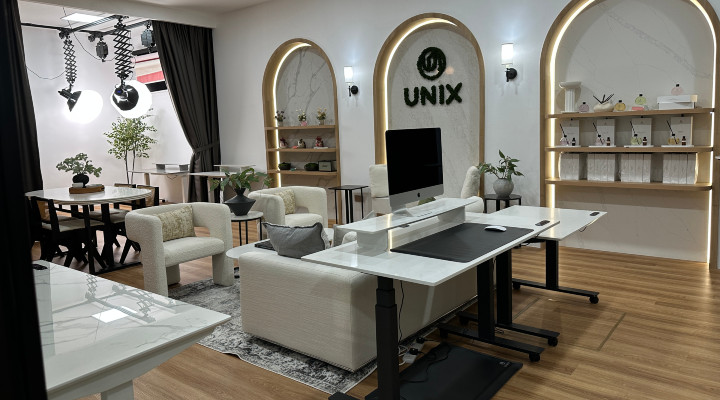Singapore’s Unix Furniture has carved out a niche for itself in the booming work-from-home category by taking an unusual approach to standing desks. Instead of the typical wooden surfaces that most brands offer, Unix uses stone slabs, which can be customised to suit different styles and spaces. “At Unix Furniture, we are proud to offer extensive design options and customisability, and white-glove customer service at price points that are comparable to those of a premium wooden standing d
g desk,” Unix Furniture’s co-founder Chris Goh told Inside Retail.
Co-founder of Unix furniture, Chris Goh.
The brand uses NSF-certified anti-bacterial quartz slabs. NSF-certification ensures that the quartz slabs have passed stringent tests for public health protection, which means they can also be used as hygienic food preparation surfaces.
In fact, Unix Furniture uses the same quality of quartz for its tables as those that are commonly found in busy kitchens and high-end hotel lobbies. Unix Furniture’s quartz standing desks are also stain, impact, knock and heat resistant, making them more robust and durable than the typical wooden standing desks.
The origins
The company was established in late 2016, and it initially focused on providing kitchen countertop installation services to professionals, such as architects, contractors and interior designers under a B2B model.
When the pandemic hit, there was suddenly a demand for the company’s customisable desks as working from home became the new normal for many people in the country.
“Unix Furniture’s first stock arrived in early April 2020, just before the circuit breaker was announced on 7 April 2020. We hit the ground running soon after,” Goh explained, referring to the Singapore government’s stay-at-home orders during the Covid-19 pandemic.
According to him, over the past six years, the company has expanded its operations and now has a fully equipped fabrication facility.
“We recently acquired one of the stone fabrication companies that we previously worked with, resulting in a five-fold increase in our team size. This increased our capabilities to better service both our B2B and B2C customers,” he said.
The appeal of stone
Goh never expected customers to have such a connection with the brand’s stone top tables.
“When we launched our first desks, I was surprised at how excited people were when they saw the desks. Their eyes would widen, and I would frequently overhear many people saying how much they loved the designs. There’s an almost visceral reaction to them,” he said.
The stone that the company uses comes in over 100 unique designs and patterns, from natural marble veins to neutral speckled looks. However, stone is a more challenging material to work with compared to wood.
“For example, most (more handy) customers can just drill a grommet hole themselves in a wooden table but you would want an experienced professional to do that for you on a stone table,” he added, noting that many customers customise their tables with extra elements, such as desk lights, pegboards, organisers and smart devices.
Solving pain points
As always, the origins of these desks had their roots in trying to solve paint points. Goh’s wife had wanted a dining table top to match the quartz top of her kitchen countertop. It was all about creating a seamless look for their open-concept home.
Goh quickly realised that traditional furniture stores did not offer adequate customisation options for dining tables.
“I felt limited by the sizes, shapes, designs, and colours that were only available in the store. It seemed like I was being ‘forced’ to choose one of those options simply because I needed a table, rather than being able to create something that was uniquely mine,” he explained.
Moreover, the prices of walnut wood and quartz tables were much higher than he had anticipated. This experience led him and his wife to create a brand with customisable offerings that were accessible with affordable prices for consumers.
The future
Interestingly, Goh said that the widespread adoption of BNPL apps in Singapore has also helped the company’s commercial operations, and the continued acceptance of WFH options helped the company, too.
“In fact, there is a growing online community dedicated to sharing and showcasing their work-from-home setups. We are working to provide customers with a platform that allows them to build their own personalised desks with our product visualiser,” he elaborated.
One of the biggest challenges for the brand is to expand its product line overseas. Unlike wooden standing desks that are lightweight, these stone desks are heavy and require proper packaging.
This is something that the company is looking into in terms of how to innovate and streamline their processes to make its products more accessible to customers worldwide.

